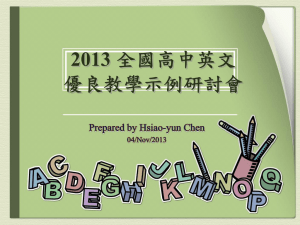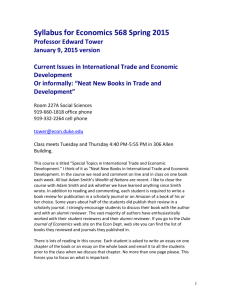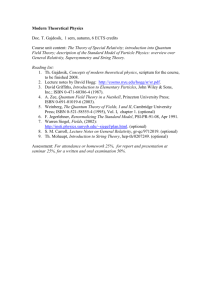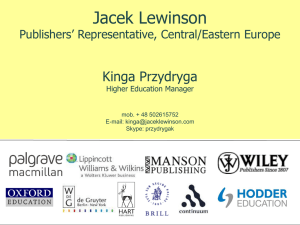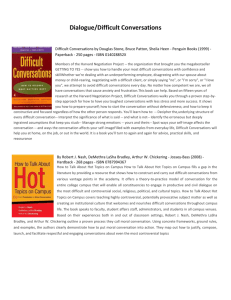ECON 568. Current Issues in International Trade
advertisement
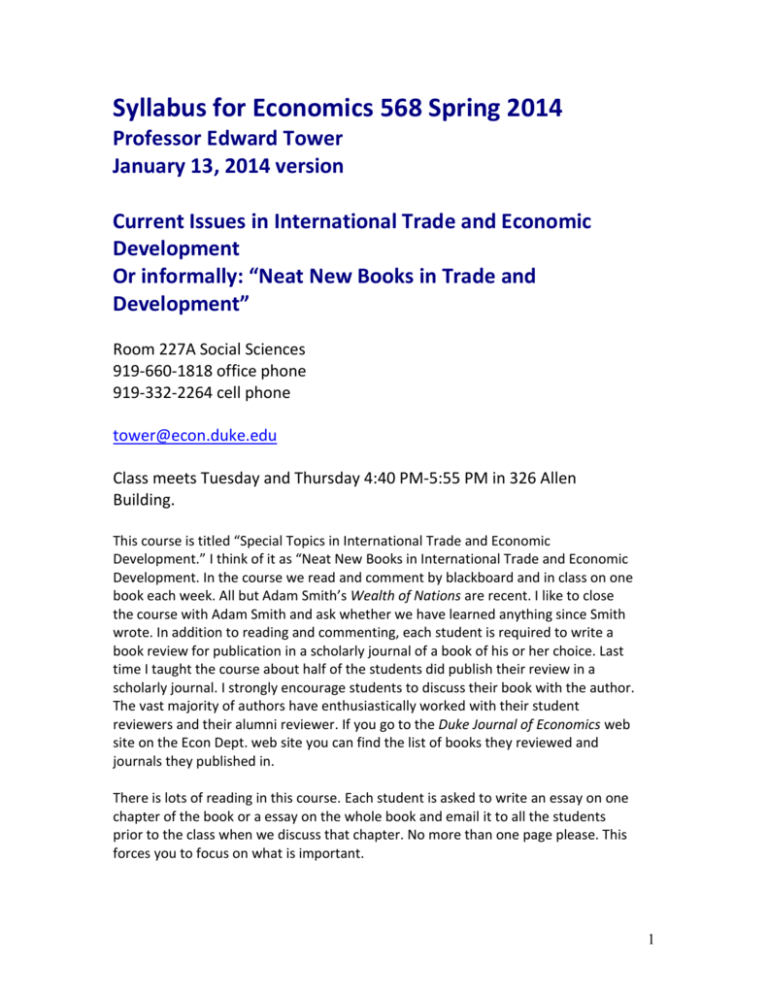
Syllabus for Economics 568 Spring 2014 Professor Edward Tower January 13, 2014 version Current Issues in International Trade and Economic Development Or informally: “Neat New Books in Trade and Development” Room 227A Social Sciences 919-660-1818 office phone 919-332-2264 cell phone tower@econ.duke.edu Class meets Tuesday and Thursday 4:40 PM-5:55 PM in 326 Allen Building. This course is titled “Special Topics in International Trade and Economic Development.” I think of it as “Neat New Books in International Trade and Economic Development. In the course we read and comment by blackboard and in class on one book each week. All but Adam Smith’s Wealth of Nations are recent. I like to close the course with Adam Smith and ask whether we have learned anything since Smith wrote. In addition to reading and commenting, each student is required to write a book review for publication in a scholarly journal of a book of his or her choice. Last time I taught the course about half of the students did publish their review in a scholarly journal. I strongly encourage students to discuss their book with the author. The vast majority of authors have enthusiastically worked with their student reviewers and their alumni reviewer. If you go to the Duke Journal of Economics web site on the Econ Dept. web site you can find the list of books they reviewed and journals they published in. There is lots of reading in this course. Each student is asked to write an essay on one chapter of the book or a essay on the whole book and email it to all the students prior to the class when we discuss that chapter. No more than one page please. This forces you to focus on what is important. 1 This semester’s readings are eclectic, covering a number of different areas. That is intentional. I tried to find a set of books that give worthwhile insights into economics and are written in novel ways. Class attendance is required. Part of the grade will depend on it. If you cannot make a class, it is important that you let me know in advance. My major goal in the course is for you to write an excellent book review and to exhibit professionalism by finding a suitable place to publish it in a timely fashion. I realize that some students will be luckier than others in finding a responsible editor who responds to queries promptly and either promptly accepts or rejects your work. A prompt rejection is a good thing for it allows you to find another outlet while your book is still new. So the grade does not depend on whether you find a place to publish your review. Rather it depends on the quality of your product, your correspondence with your author and alumni reader and your book review editor(s). I do not assign grades to your short essays. However, emailing them on time saying something interesting in them, and coming to class with something interesting to say is important. I will comment briefly on your essays. The book review counts 75 percent of the grade and the combination of short essays and class presence and class discussion counts 25 percent of the grade. In class discussion, the important thing is to help make the class worthwhile for your classmates. The book list: Writing 1.Diedre McCloskey, Economical Writing, Waveland Press, ISBN 1-57766-063-3, 2000, paperback, 98pp., $10.49 from Amazon. Libertarianism 2. Milton Friedman. Capitalism and Freedom. 2002. ISBN 0-226-26421-1. University of Chicago Press. $13.68 2 Development 3. Paul Holden, Sarah Holden and Malcom Bale, Swimming Against the Tide? An Assessment of the Private Sector in the Pacific. Asian Development Bank, 2004. 174pp. Available free at: http://www.adb.org/Documents/Books/Swimming_Against_Tide/swimming_against _tide.pdf 4. Jagdish Bhagwati and Arvind Panagariya. Why Growth Matters: How Economic Growth in India Reduced Poverty and Lessons for Other Developing Countries. 2013.ISBN 978-1-61039272-3 Public Affairs. $14.31 5.Abhijit V. Bannerjee and Esther Duflo, Poor Economics: A Radical Rethinking of the Way to Fight Global Poverty. 2011. ISBN 978-1-61039-093-4. (paperback) Public Affairs $10.87 new from Amazon. $2.95+ 3 6.William Easterly. The Illusive Quest for Growth: Economists’ Adventures and Misadventures in the Tropics. 2002. ISBN 0-262-55042-3. MIT. $11.94 Inequality 7.Angus Deaton. The Great Escape: Health, Wealth and the Origins of Inequality. 2013 ISBN 9780-691-15354-4. Princeton. $19.98. 8.Edmund Phelps. Mass Flourishing: How Grassroots Innovation Created Jobs, Challenge and Change. 2013. ISBN 978-0-691-15898-3. Harvard University Press. $18.75. 4 9.Brink Lindsey. Human Capitalism: How Economic Growth Has Made Us Smarter—and More Unequal. Princeton. ISBN 978-0-91-15732-0. 2013. $14.95. The Environment in History 10. Jared Diamond, Collapse: How Societies Choose to Succeed or Fail, Penguin, ISBN 0670-03337-5. 2005, 575pp. $2.82+$3.99 shipping from Amazon. Here is an important review of Collapse by Jackson Lears, followed by really interesting comments. (Thanks to Charlie Becker for this reference). http://www.bookforum.com/inprint/019_04/10583 Economic History 5 11. William Bernstein. Masters of the Word. I have the draft of this book. It is to be published in 2013. Neat discussion of the role of communications on history. We will probably be talking with Bill about a different book of his, but who knows? Corruption 12. PECULIAR DYNAMICS OF CORRUPTION: Religion, Gender, EU Membership, and Others Omer Gokcekus Kevin Bengyak The Master 6 13. Adam Smith, An Inquiry into the Nature and Causes of the Wealth of Nations [Facsimile] [Paperback]. $6.50 second hand from Amazon. Around 1000 pages. University of Chicago Press, 0-226-76374-9. Here is a neat web site that allows you to find the cheapest source of each book. It was set up by two undergraduates. http://www.campusbooks4less.com/cgibin/bookSearch/bookstoreSearch.cgi?searchBy=isbn&searchVal=061852844X&func=submit Class Schedule: January 2012 Th9 Introduction Tu14 will discuss McCloskey and the Duke econ dept. writing manual. You can find the writing manual at http://lupus.econ.duke.edu/ecoteach/undergrad/manual.pdf . Discussion from administrator of the Alumni reader project and the writing studio. The McCloskey book is short, so one class period should be enough. Book list of five possible titles for review due. You might look at Amazon and at publisher’s web pages. Please email me a list of the books you are thinking about and briefly why. This will speed up discussion. Pick a book you think you will like. When you send your review to the author it is nice to be able to tell him or her that you like the book. Please email me your thoughts about the book (one page max), before noon on Tuesday at the very latest. These can be things you think are particularly interesting, or wrong, or related thoughts that you have. One page comment on McCloskey due. Th16 Book list of five possible titles for review due. Essay due on what makes a good book review and what makes a bad one with examples from the Economist, the Journal of Economic Literature and the New York Times. 1 page. 7 Here is an important review of one recent book. (Thanks to Charlie Becker for the reference). http://www.nybooks.com/articles/archives/2012/jun/07/what-makes-countries-rich-orpoor/?pagination=false Tu21 Friedman’s Capitalism and Friedman or one of Friedman’s other books such as Dollars and Deficits or Money Mischief, or Friedrich Hayak’s Road to Serfdom. Th23. Holden, Holden and Bale. This book is free on line. Available free at: http://mpra.ub.uni-muenchen.de/4207/1/swimming_against_tide.pdf . Next class Paul Holden will join us by Skype. He is a former PhD student of mine. His daughter, Sarah, is a former undergrad research assistant of mine. This book gets to the heart of practical development economics. Your assignment is to email your reaction to part of the book prior to our discussion with him. Please email him a question about the book the day before the class. His email is Paul Holden <ph@erinstitute.org> Tu 28 Skype conversation with Paul Holden Th 30. Send corrections to Omer Gokcekus on his book on corruption. List of journals to which you will submit your review, at least 5 with a ranking of best to worst prospects, with a brief explanation of your choices. You need to have examined recent journals at Bostock library. February Tu4 Easterly part I. Essay on the book due. Th6 Easterly Part II. A one page outline of your review is due. Tu11. I will break the class into 3 groups. Please sign yourself up for one group. First group Tues 12-115, Second group Tues at 3-415, third group Wed at 440-6, The Tuesday meeting at class time will be in our classroom. The other meetings will be in my office. First draft of your review is due. Please bring 4 hard copies to the meeting. Th 13. Deaton. The Great Escape. One page essay due. Tu18 Phelps. One page essay due. 8 Th21 Second draft of your review is due. Phelps Tu25 conversations in small groups about near final drafts of your reviews. Th27 Diamond’s Collapse. one page essay due. March Tu 4 Poor Economics Part I.One page essay due. Th6 Poor Economics Part II Third draft of your review is due. Tu11 Spring Break Th13 Spring Break Tu18 Bernstein Part I. We will read something he has written. Discussion of draft of review. Th 20 Bernstein Part II. Skype conversation with Bernstein. Second draft of your review is due Tu 25 Brink Lindsay part I. Email review to author for comments. Th 28 Brink Lindsay. Part II. April Tu1 . Discussion of books students have reviewed Revision of your review is due in light of author’s comments. Discussion of draft Th3 .Discussion of books students have reviewed. Discussion of draft Review is emailed to journal. Tu8 Adam Smith’s Wealth of Nations or Theory of Moral Sentiments (which I have not read). One page essay on something interesting about Adam Smith. Th10. Bhagwati and Panagariya Please do not email review to journal until I approve the review. We do not want to poison the well. It is important for journal editors to know we send out only the best reviews for publication. 9 Tu15. Your assignment is to find a time in history when something important happened, and see if the reporters who covered the story got it right. The Economist. The Times of London. The New York Times are all good sources. Great Books of All Time. These are the books that I have used in the past, and would be tempted to use again. Students who feel their interests would be served by substituting reading in some of these books for the assignments that I have listed are free to do so. Adam Smith, The Theory of Moral Sentiments Robert Barro, Determinents of Economic Growth: A Cross-country Empirical Study, Lional Robins Lecture, Paperback, 1999, second edition, MIT ISBN 0-262-52254-3. 145 pages. $12.90 from Amazon. Alan S. Blinder. “Hard Heads, Soft Hearts: Tough Minded Economics for a Just Society.” $4.00. 10 Edward Chancellor. Devil Take the Hindmost: A History of Financial Speculaton. $8.92. Russell Roberts The Choice. A nontechnical introduction to international trade Doug Irwin, Free Trade Under Fire, Princeton University Press, 2009, 313pp. paperback, ISBN 978-0-691-14315-6. $19.62 from Amazon A marvelous discussion of international trade issues facing the US. The third edition is better than the other two. Not technical. Douglas Irwin, Trade Policy Disaster: Lessons from the 1930’s. (Ohlin lectures). $22.01 from Amazon. December 2011. ISBN-10: 0-262-01671-0 ISBN-13: 978-0-262-01671-1. MIT Press. Excellent economic history of trade policy. Jared Diamond. Guns, Germs and Steel. Economic prehistory. Explains why Europe and Asia beat out Africa and the Americas in having early economic development. Milton Friedman. Capitalism and Freedom. The best defense of the market I know. Marvelously well written. The bible of libertarianism. $6.99 Milton Friedman, Money Mischief. William Easterly. The Illusive Quest for Growth. A spectacular discussion of what is wrong with economic development aid. Beautifully written. Robert E. Anderson. Just Get out of the Way: How Government Can Help Business in Poor Countries. $24.95. Cato Institute. 2004. On the Amazon web site some are 11 available for $0.70 plus $3.99 shipping. ISBN 1-930865-54-6. Hardbound. 274pp. Blames developing nations for their lack of economic development. My students last year felt that the whole book could have been summarized in a journal article. But I like it, in spite of its repetition. ………………………. Here are some other neat books. Michael Lewis. Boomerang: Travels in the Third World. WW Norton. ISBN 978393 08181-7. Cloth. 2011. $16.47 from Amazon. ISBN 978-4008-2986-6. $14.10 from Amazon. Paul Collier. “The Plundered Planet: Why we Must—and How We Can— Manage Nature for Global Prosperity.” 249pp. ISBN 978-0-19-539525-9. Nov 2011. $11.52. 12 Jagdish N. Bhagwati, Termites in the Trading System: How Preferential Agreements Can Undermine Free Trade, 2008, Council of Foreign Relations, $11.46 from Amazon. ISBN 978-0-19-533165-3. 127pp Gregory Clark, A Farewell to Alms, Princeton University Press, 2007, $18.95, $12.89 from Amazon, paperback. ISBN 978-0-19-533165-3. 418pp. Blames population growth for low standards of living. NeoMalthusianism. Paul Collier “The Bottom Billion: Why the Poorest Economies are Failing and What Can be Done About it.” $10.21 Milton Friedman Money Mischief: Episodes in Monetary History.”$10.17 F. Hayek. The Road to Serfdom. Alan B. Krueger. What Makes a Terrorist: Economics and the Roots of Terrorism.” Princeton University Press, Princeton and Woodstock, UK. 2007. 14.99/$24.95. ISBN: 978-0-691-13438-3. 194pp. $10.17 from Amazon. Not a great book. But an interesting one, so if your fascination is with terrorism this is a good book to read. Paul Krugman. “The Accidental Theorist and Other Dispatches from the Dismal Science.” 1999. $4.00 Paul Krugman. “Pop Internationalism.”1996. $4.93. 13 Michael Lewis, The Big Short Stephen Parente and Edward C. Prescott. Barriers to Riches. 6.89 World Bank. The East Asian Miracle Money Mischief by Milton Friedman. Harvard University Press. ISBN 978-0-674-06078-4. (Apr 25, 2011) $23.19. 213pp. Money Mischief: Episodes in Monetary History (Harvest Book) [Bargain Price] [Paperback] Milton Friedman (Author) B000AQ23N6 4.4 out of 5 stars See all reviews (36 customer reviews) | Like (0) Available from these sellers. 16 new from $6.19 28 used from $5.83 Jacob Appel and Dean Karlan More Than Good Intentions: How a New Economics is Helping to Solve Global Poverty. Penguin. 295 pp. ISBN 1-101-46804-1. April 14, 2011. $14.05 14 6. Charles Kenny. Getting Better: Why Global Development is Succeding—And How We Can Improve the World Even More. March 1, 2011. Basic Books. ISBN 978-0465-0215-7. 175+pp. $6.43. Genghis Khan and the Making of the Modern World. Jack Weatherford. 2005. Paperback. $7.36 second hand from Amazon. Three River Press. 305+pp. ISBN 0-609-80964-4. 15 These books might be excellent. I have not read them. Paul Seabright. The Company of Strangers. Priinceton Univ Press. $9.94. 2010. 365+ pp. 978-0-691-14646-1. The Squam Lake Report: Fixing the Financial System. Kenneth R. French, Martin N. Baily, John Y. Campbell, John H. Cochrane, Douglas W. Diamond, Darrell Duffie, Anil K Kashyap, Frederic S. Mishkin, Raghuram G. Rajan, David S. Scharfstein, Robert J. Shiller, Hyun Song Shin, Matthew J. Slaughter, Jeremy C. Stein & Rene M. Stulz 16 World Bank. “Doing Business 2012 (in A More Transparent World). World Bank. October 2012. Paperback. 264pp. $35 from Amazon. Robert H. Frank. The Darwin Economy: Liberty, Competition and the Common Good. $15.81 from Amazon. 229pp. Princeton University Press, 2011. 17 Anne Krueger’s STRUGGLING WITH SUCCESS Challenges Facing the International Economy. $56. January 2011. She also has a new book out. I cant find it. William W. Lewis. The Power of Productivity: Wealth, Poverty, and the Threat to Global Stability.” 2005. $11.90. Doug Irwin suggested this when he was visiting. World Bank. World Development Report 2012: Gender Equality and Development.” October 2011. $50. World Bank. World Development Report 2011: Conflict, Security, and Development. 2011. $42. The United Nations office in Bangkok (The Economic and Social Commission for Asia and the Pacific) has a book review web site. Mia Mikic coordinates it. I taught with Mia at the University of Auckland, and she generously arranged for me to teach in Croatia with her at the University of Zagreb when she was chair of the Econ Dept there. Now she is organizing the book review web site at Artnet (the training arm of ESCAP). A year ago, she was looking for quality reviews of the books listed below. The link immediately below is to the review that Allison Jaros wrote of Doug Irwin's book on the Hawley-Smoot tariff and is posted on this website. This is your chance to improve policy making in Asia and the Pacific by transmitting important ideas to policy makers there. 18 > > http://www.unescap.org/tid/artnet/book-reviews-list.asp > > > -----Original Message----> From: Mia Mikic [mailto:mikic@un.org] > Sent: Wednesday, November 23, 2011 4:17 AM > To: tower@duke.edu > Subject: RE: [1] new discussion on LinkedIn > > thank you Ed for thinking about our book review series, which is not flooded by submissions (is anyone reading any longer?) > > I am sure you are much better informed of the new books in trade/development disciplines but I can give you few examples (sorry for very unprofessional > listing) > > Understanding Global Trade by Elhanan Helpman (Apr 25, 2011) > > Economic Diplomacy: Essays and Reflections by Singapore's Negotiators [Hardcover] C. L. Lim (Author, Editor), Margaret Liang (Editor) > > From Financial Crisis to Global Recovery by Padma Desai (Jun 1, 2011) > > A Splendid Exchange: How Trade Shaped the World by William J. Bernstein (May 6, 2009). Sophie Brown is planning to review this one . > > American Protectionism (1898): Historical Essays on Trade Policy (Economic Ideas that Built America) by Ugo Rabbeno and Francesca L. Viano (Jul 1, > 2012) > > not directly related but surely good; > > The Art of Strategy: A Game Theorist's Guide to Success in Business and Life by Avinash K. Dixit and Barry J. Nalebuff (Jan 4, 2010) > > More later, > > > Mia Mikic, PhD > ARTNeT Coordinator > Trade Policy Section, United Nations ESCAP Bangkok 10200, Thailand ==================== > Ph: (66) 2 288 1410, Mob: (66) 81 720 3706 > Email: mikic@un.org > ==================== > www.unescap.org/tid/aptiad > www.artnetontrade.org > Twitter@ARTNeTontrade 19 Here is a new book jointly edited by my colleague at UNC, Steven Rosefielde. Two Asias: The Emerging Postcrisis Divide by Steven Rosefielde, Masaaki Kuboniwa and Satoshi Mizobata (Dec 15, 2011) Buy new: $72.00 ************************************************ ************ Book list from Paul Holden aug 2012 Fairness and Freedom david fischer. Comparison of evolution of New Zealand and the US. New Geography of Jobs. Enrico moretti Tyler cowen. An economist gets lunch, the great stagnation. Tim hardford. Adapt. Allan Meltzer. Why capitalism Due Dilligance David Rudland. About micro-finance The company of stangers, a natural history of economic life. Paul seabrook. Just get out of the way, Anderson. The longeverty project. Howard friedman and leslie martin. ************************************************ William Bernstein. The Birth of Plenty. 403pp. 2004. 0-07-142-192-0 McGraw-Hill. $13. Anytime except jan 23-march 1 say. 20 Doing Business 2012 (in A More Transparent World. World Bank). October 2011. It can be downloaded for free from the following web site. http://www.doingbusiness.org/~/media/FPDKM/Doing%20Business/Documents/AnnualReports/English/DB12-FullReport.pdf Neat new books from 2012 Tyler Cowen, The Great Stagnation: How America Ate All the Low Hanging Fruit, Got Sick, and Will Eventually Feel Better. 109pp. $12.95 Retail. 978-0-525-95271-8. Dutton. Penguin Group. 2011. $6.89. 978-1-101-50225-9. Tyler Cowen, An Economist Gets Lunch, $26.95 Retail. 978-0525-95266-4. 2012. 293pp Edward Conrad, Unintended Consequences: Why Everything You’ve Been Told About the Economy is Wrong. $27.95 Retail. 978-1-59184-550-8. $310pp. Joseph E. Stiglitz, The Price of Inequality: How Today’s Divided Society Endangers our Future. $27.95 retail, 414pp. 978-0—393-08869-4 WW Norton. 2012. Michael Spence, The Next Convergence, Picador, 978-0-374-15975-7. 296pp. 2012. $17. Retail 21 Ruchir Sharma. Breakout Nations: In Pursuit of the Next Economic Miracles. 978-0-393-08026-1. $26.95 retail. Norton. $292. 2012 Allan H. Metzler. Why Capitalism? Oxford 154pp. $21.95. 978-0-19-985957-3. 2012 Justin Yifu Lin. The Quest for Prosperity: How Developing Countries Can Take Off. Princeton. $27.95. 978-0-691-15589-0 322pp.2012. Scott Patterson. Dark Pools: High-Speed Traders, I.I. Bandits, and the Threat to the Global Financial System. Crown Business. 978-0-307-88717-7 355pp. $27. Dambisa Moyo. Winner Take All; China’s Race for Resources and What It Means for the World. Basic Books. $26.99. 978-0-02828-3 257pp. 2012. Steven E. Landsburg. The Armchair Economist: Economics and Everyday Life. Revised and Updated for the 21st century. Free Press. 315pp. $16. 978-1-4516-5173-7. 2012. Paul Krugman, End This Depression Now! Norton. 259pp. 978-0-393-08877-9 $24.95 retail. 2012 22
